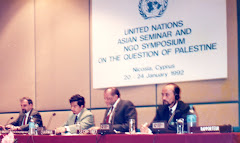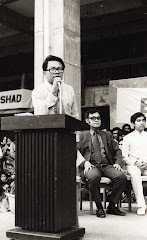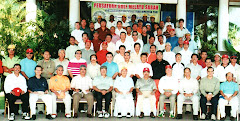In the name of Allaah, the Most-Merciful, the All-Compassionate
Ramadaan: It’s Virtues and Benefits
Compiled by Imran Ayub
Alhamdulilah. Indeed, all praise is due to Allaah. We praise Him and seek His help and forgiveness. We seek refuge in Allaah from our souls’ evil and our wrong doings. He whom Allaah guides, no one can misguide; and he whom He misguides, no one can guide. I bear witness that there is no (true) God except Allaah – alone without a partner, and I bear witness that Muhammad (peace be upon him) is His ‘Abd (servant) and messenger
1. The name “Ramadaan”
The word Ramadaan comes from the word Ramad, which refers to “the heat of the stones arising from the intense heat of the sun.” the ninth month was named Ramadaan because when the Arabs changed he names of the months from the ancient language, they named them according to the seasons in which they happen to fall. This month, which used to be called Naatiq, fell during the summer, the time of extreme heat.[1]
2. The merits of Ramadaan
2.1 The Devils are chained, the Gates of Hell are locked and the Gates of Paradise are opened.
Narrated Aboo Hurayrah (may Allaah be pleased with him): Allaah's Apostle (peace be upon him) said, “When the month of Ramadan comes, the gates of Paradise are opened and the gates of the (Hell) Fire are closed, and the devils are chained.”[2]
All of this is done during the first night of the blessed month. The Prophet (peace be upon him) said: “When it is the first night of the month of Ramadaan the evil devils are chained. The gates of the Fire are locked – not a single gate is opened, and the gates of Paradise are opened – not a single gate is locked, and a caller calls out: O seeker of good come forward, and O seeker of evil withhold, and there are many whom Allaah frees from the Fire, and that is every night.”[3]
So evil is lessened in this blessed month since the evil jinn are bound with chains, shackles and bonds. Thus, they are unable to corrupt the people as they do at other times, since the Muslims are occupied with fasting which subdues desires, and with reciting Qur’aan and with other acts of worship which refine and purify the souls. The Lord of Honour and Power says:
“O you who believe! Observing As-Sawm (the fasting) is prescribed for you as it was prescribed for those before you, that you may become Al-Muttaqûn (the pious ).”[4]
Therefore, the gates of Hell are locked and the gates of Paradise are opened since righteousness are many and good words are plentiful.[5]
2.2 Sins get Forgiven
Fasting in Ramadaan is also an opportunity to atone of one’s sins.[6] Narrated Aboo Hurayrah (may Allaah be pleased with him): The Prophet (peace be upon him) said, "Whoever established prayers on the night of Qadr out of sincere faith and hoping for a reward from Allaah, then all his previous sins will be forgiven; and whoever fasts in the month of Ramadan out of sincere faith, and hoping for a reward from Allaah, then all his previous sins will be forgiven."[7]
Narrated Aboo Hurayrah (may Allaah be pleased with him): Verily the Messenger of Allaah (peace be upon him) said: “Five (daily) prayers and from one Friday prayer to the (next) Friday prayer, and from Ramadaan to Ramadaan are expiations for the (sins) committed in between (their intervals) provided one shuns the major sins.”[8] One should take advantage of all the rewards and blessings of this sacred month, especially since he does not know when his time of death will come.
2.3 Protection from Evil
Fasting also provides protection from evil for those who sincerely fast. Aboo Hurayrah (may Allaah be pleased with him) reported Allaah's Messenger (may peace be upon him) as saying: “Fasting is a shield.”[9]
2.4 Special Reward
Allaah has a special reward which He personally gives one who fasts faithfully. Aboo Hurayrah (may Allaah be pleased with him) reported Allaah's Messenger (peace be upon him) as saying: Allaah, the Exalted and Majestic, said: “Every act of the son of Adam is for him, except fasting. It is (exclusively) meant for Me and I (alone) will reward it. Fasting is a shield. When any one of you is fasting on a day, he should neither indulge in obscene language, nor raise the voice; or if anyone reviles him or tries to quarrel with him he should say: I am a person fasting. By Him, in Whose Hand is the life of Muhammad, the breath of the observer of fast is sweeter to Allaah on the Day of judgment than the fragrance of musk. The one who fasts has two (occasions) of joy, one when he breaks the fast he is glad with the breaking of (the fast) and one when he meets his Lord he is glad with his fast.”[10]
2.5 Qur’an was Revealed
Perhaps the greatest and most unique merit of Ramadaan lies in the fact that the Qur’an, which is the last and only unchanged book of Divine Guidance remaining in the world, was revealed during this month.[11] Allaah, the Almighty states, “The month of Ramadân in which was revealed the Qur'ân, a guidance for mankind and clear proofs for the guidance and the criterion (between right and wrong)…”[12]
2.6 One’s Dua is accepted
The person, who fasts in Ramadan, will have his Dua accepted before the time of iftaar (the breaking of the fast). Allaah has created this life as a test for human beings, and there comes times where he faces difficulties and problems. Therefore, he should always turn back to his Lord, who will help ease and eliminate the obstacles he is facing. Allaah offers the time before iftaar as a means for Muslims to have their Dua answered and accepted.[13]
Narrated ‘Abdullah ibn ‘Amr ibn al – ‘Aas (may Allaah be pleased with him): Allaah’s Messenger (peace be upon him) said, “Indeed there is for the fasting person, when he breaks his fast, a supplication which is not rejected.”[14]
2.7 Freedom from the Fire is granted.
Every night in Ramadaan, Allaah chooses people to be saved from the hell fire. Simple acts can be a reason for people to be saved. This includes even feeding a fasting person.[15] Narrated Jaabir (may Allaah be pleased with him): The Prophet (peace be upon him said), “There are in the month of Ramadan in everyday and night those to who Allaah grants freedom from the Fire, and there is for every Muslim a supplication which he can make and will be granted.”[16]
2.8 One will receive mountains of reward on the judgment day.
In the month of Ramadan, we commonly here from people that Allaah multiplies the good deeds by 70. If one is to do a deed now, he would have to do it 70 times in order to receive the equivalent amount of one deed done in Ramadan. However, this is actually based on a weak hadeeth.[17] The reason I added it here is to make everyone aware of this.[18
In reality, good deeds are multiplied from 10 – 700 times in Ramadaan, and every other month and nothing is exempted from that apart from fasting, for its reward is immense and unlimited, as can be seen in the following hadeeth Qudsi: Narrated Ibn 'Abbaas (may Allaah be pleased with him): The Prophet (peace be upon him) narrating about his Lord, The Most High, said, "Allaah ordered (the appointed angels over you) that the good and the bad deeds be written, and He then showed (the way) how (to write). If somebody intends to do a good deed and he does not do it, then Allaah will write for him a full good deed (in his account with Him); and if he intends to do a good deed and actually did it, then Allaah will write for him (in his account) with Him (its reward equal) from ten to seven hundred times to many more times: and if somebody intended to do a bad deed and he does not do it, then Allaah will write a full good deed (in his account) with Him, and if he intended to do it (a bad deed) and actually did it, then Allaah will write one bad deed (in his account) ."[19]
2.9 He will be among the true Followers of the Prophets and Martyrs
Narrated 'Amr ibn Murrah al – Juhanee (may Allaah be pleased with him), “A man came to the Prophet (peace be upon him) and said, ‘O Messenger of Allaah (peace be upon him), what if I testify that none has the right to be worshipped but Allaah, and that you are the Messenger of Allaah, and I observe five daily prayers, and I pay the Zakaah, and I fast and stand in prayer in Ramadaan, then amongst whom shall I be?’ He said, ‘Among the true followers of the prophets and the martyrs.’”[20]
And It is Only Allaah Who grants success. May Allaah Exalt the mention of His slave and Messenger Muhammad (peace be upon him), and render him, his household and companion safe from Evil.
------------------------------------------------------------
References:
× ‘Fasting In Ramadaan’, by Sheikh Saleem al – Hilaalee and ‘Alee ‘Abdul Hameed, al – Hidaayah Publishers, 1999
× ‘Islamic Studies Book 3’, by Dr. Abu Ameenah Bilal Philips, IIPH publishers, 2005
× ‘Ramadaan: Rules and Related Issues’, by Hafiz Salah – ud – Din Yusuf, Darussalam publishers, 199
× ‘Ramadaan’, by Sheikh Ahmad Musa Jibreel, http://www.ahmadjibril.com/articles/ramadan.html
× www.islamqa.com
[1] E. W. Lane, Lane’s Lexicon, Vol. 1, P. 1156 – 1157. As quoted in ‘Islamic Studies Book 3’, p. 186
[2] (Agreed Upon); Saheeh Bukhaari, Volume 4, Book 54, Number 497; Saheeh Muslim, Book 006, Number 2361
[3] Sunan at – Tirmithee, Number 682, Sunan Ibn Maajah, Number 1642, and Ibn Khuzaymah, 3/188. This chain of narration is Hasan; as quoted in ‘Fasting in Ramadaan’, p. 12
[4] The Noble Qur’aan, Soorah Al-Baqarah 2:183
[5] ‘Fasting in Ramadaan’, p. 11 – 12
[7] Saheeh Bukhaari, Volume 3, Book 31, Number 125
[8] Saheeh Muslim, Book 002, Number 0450
[9] Saheeh Muslim, Book 006, Number 2565
[10] Saheeh Muslim, Book 006, Number 2566
[11] ‘Islamic Studies Book 3’, p. 187
[12] The Noble Qur’an, Soorah Al-Baqarah 2:185
[14] Sunan Ibn Maajah, 1/557; al – Haakim, 1/422; Ibn as – Sunnee, Number 128; at – Tayaalisee, Number 299; through two chains of narration from him and al – Boosairee said: 2/81: This isnaad is Saheeh, its narrators are reliable; as quoted in ‘Fasting in Ramadaan’, p. 61. Classed Saheeh by Sheikh al – Albaanee in Saheeh Sunan ibn Maajah, Number 1432; as quoted in ‘Ramadaan: Rules and Related Issues’, p. 14
[16] Reported by al – Bazzaar, Number 3142 and Ahmad, 2/254 by way of al – A’mash: from Aboo Saalih: from Jaabir. Ibn Maajah, Number 1643, reports it from him in shortened form through a different chain, and it is Saheeh. And the supplication which is granted is at the time of breaking the fast (Iftaar) [Refer to: http://groups.yahoo.com/group/Islam_True/message/565]; as quoted in ‘Fasting in Ramadaan’, p. 18
[19] (Agreed Upon); Saheeh Bukhaari, Volume 8, Book 76, Number 498; Saheeh Muslim, Book 001, Number 0237
[20] Reported by Ibn Hibaan, in az – Zawaa’id, Number 19 and its chain of narration is Saheeh; as quoted in ‘Fasting in Ramadaan’, p. 18
Compiled from various sources.
Permission is granted to circulate among private individuals and groups, to post on Internet sites and to publish in full text and subject title in not-for-profit publications.














































